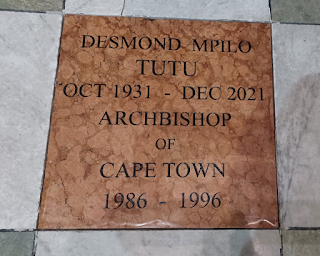After the week you have all been through, the emotions that have tumbled through your minds, the worry that all of us shared that we will pay adequate tribute to this, our father and grandfather in God, I am reminded of one of the stories that uTata used to tell. You all know it: the one about the preacher who went on and on and on, then said, “What more can I say?” And quick as a flash, someone at the back said: “Amen”.
Today, there is little more that I can say. So let me limit this to a few words about a gift that has not enjoyed enough attention: his capacity for self-reflection and his gentleness. After his first sabbatical at Emory in Atlanta, over Christmas and New Year in 1992, uTata came back in self-reflective mood to speak to the Synod of Bishops. There he said that now the political leaders were out of prison, and back from exile, his role as an interim leader was over and he hoped to take a lower profile. He went on to say that he was concerned that during the struggle years, he had been too abrasive, too self-righteous, too harsh in his judgements.When he retired in 1996, he said something similar, apologising in that huge farewell in the Good Hope Centre for any hurts he may have caused.
And although he was famously strict with us, his clergy and his staff, he was gentle in his admonition. If you forgot to put on your clerical collar, he would just say, “Father, you are under-dressed.” He said it with humour but he meant it. If you were late for a meeting, there was a tap on his watch, and the question: “Don’t I pay you enough to buy a proper watch?”
My own treasured memory, as one who was chosen by him to go to theological college, is of the early years of my ministry. I was a priest at St Mary’s Cathedral in Johannesburg, the parish in which he was ordained deacon and priest, and in which he was installed as Dean, consecrated as Bishop of Lesotho and then enthroned as Bishop of Johannesburg. It was a very special place for him, the church whose 7am Eucharist he regularly attended. Hence it was with special trepidation that after oversleeping I arrived late for Mass, my pyjama trousers peeking out from under my cassock. The gentleness with which he both chided and forgave me is stuck firmly in my memory.
Then, just a few years ago in Milnerton, I recall his prayer during the Eucharist that we should become more loving, more caring, more patient people to one another.
It was also so with you, each member of his family. Both he and Mama agonised over you when you were struggling, celebrated your achievements. But I have to say that there was anger too, not with you but with those who made you suffer because you were his family. Famously, when you, Mama, were arrested by the Johannesburg Traffic Department, carted off to John Vorster Square, and handcuffed to a door handle. For what? For renewing your car licence late. He was furious. Would the wife of the moderator of the Dutch Reformed Church have received such treatment? he asked.
And I think he felt guilt too, sometimes wondering if he had been too strict with you as children. It is not easy to be the child of a global celebrity: If you do well, some people say, well what do you expect with those advantages, and they don’t give you adequate credit for your achievement. If you make a mistake, you are judged more harshly than others because of your perceived advantages, which may not even exist.
uTata, your husband, your brother, your dad, your granddad, your in-law, your cousin, was a full human being, comfortable in his own skin, with all the emotions, the anger, the pain, the laughter, the seriousness and the light-heartedness which comes from being a fully rounded person.
But you know that already, so let me finish my words to the family with an admonition of my own, in the spirit in which he delivered them. At times of stress in the struggle, and at times in the stress of the early 1990s when people were killing one another, and the clergy were under huge stress and strain, he would say: be gentle with one another; and be gentle with yourselves.
To the nation, contemplating Desmond Mpilo Tutu’s legacy beyond his earthly life, let us use this opportunity to turn a new page. Let us commit ourselves as a church and society to the radical, the revolutionary change that he advocated, based on the demands of the Bible. Let us live as simply as he lived, exemplified by his pine coffin with rope handles. Let those of us who have resources pull in our belts, that others can eat enough to fill their stomachs. Let us re-order our society to end inequality and create equal opportunities for all. And why don’t we rename the Cape Town International Airport the Desmond Mpilo Tutu International Airport?
God bless you and keep you.
The Most Revd Thabo Makgoba
Anglican Archbishop of Cape Town


No comments:
Post a Comment
Thanks for your feedback! Note that we do not normally publish your Anonymous comments here. Rather comment on our Facebook page: https://www.facebook.com/anglicanmediasa/